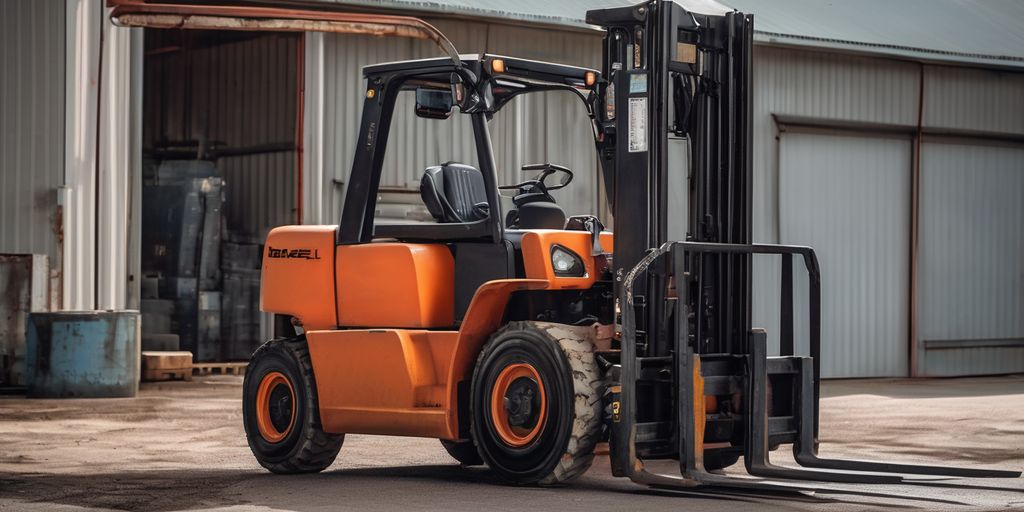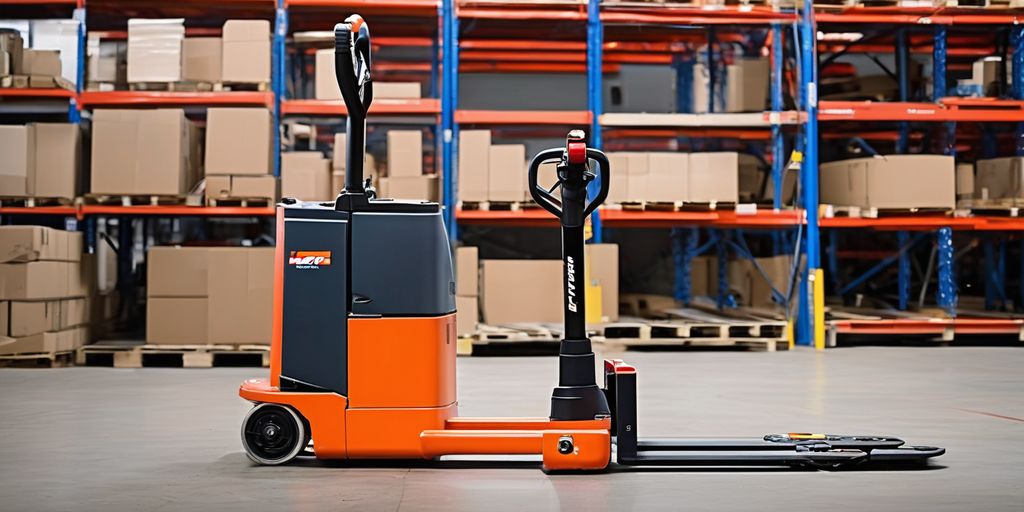The Impact of Electric Forklifts on Workplace Safety and Efficiency — overview
Electric forklifts are changing the way businesses handle materials. They offer big savings and make work easier and safer. With new battery technology and other advancements, electric forklifts are becoming a top choice for many companies. They help businesses save money, protect the environment, and keep workers healthy and safe.
Key Takeaways
- Electric forklifts save money on fuel and maintenance.
- They produce no harmful emissions, making the air cleaner.
- New technologies make them more efficient and easier to use.
- They are safer to operate with better visibility and less noise.
- Their compact design helps in tight spaces, improving maneuverability.
Cost Savings and Efficiency

Lower Operational Costs
Electric forklifts may have a higher initial acquisition cost, but they can offer potential savings and a lower total cost of ownership (TCO) through reduced maintenance and fuel costs. Electric forklifts have fewer moving parts, which means lower maintenance costs and less downtime. The absence of an internal combustion engine eliminates the need for regular oil changes, filter replacements, and other engine-related maintenance tasks.
Enhanced Productivity
Electric forklifts are known for their efficiency and reliability. They provide consistent performance, which can lead to increased productivity in the workplace. With fewer breakdowns and less downtime, workers can focus on their tasks without interruptions. This reliability translates to more efficient operations and better use of time and resources.
Energy Efficiency
Electric forklifts are more energy-efficient than their internal combustion counterparts. Their engines are much more efficient, thanks to the innovative use of electric forklift batteries. This provides better fuel efficiency and reduces energy costs by as much as 20%. Additionally, the cost of electricity is generally lower than that of gas or diesel, further contributing to long-term savings.
In an era where cost-efficiency is paramount, one might wonder, are electric forklifts worth it? Discover how these vehicles offer significant savings on operational costs and contribute to a more efficient workplace.
Environmental and Health Benefits

Switching to electric forklifts has a positive impact on both the environment and the health of workers. Unlike gas-powered models, electric forklifts produce no emissions, leading to better air quality in the workplace. This is particularly beneficial in enclosed spaces where air quality is a concern. By eliminating exhaust fumes, electric forklifts contribute to a cleaner, healthier work environment, leading to happier, more productive employees.
Enhanced Safety Features
Electric forklifts come with a range of advanced safety protocols that prioritize the protection of operators and nearby personnel. These features are designed to reduce the risk of accidents and injuries, providing additional layers of protection for everyone in the vicinity of the forklift.
Better Visibility
One of the key safety features is improved visibility. Electric forklifts often have better visibility through the mast and overhead guards, which helps operators see their surroundings more clearly. This reduces the chances of collisions and other accidents.
Reduced Risk of Fire
Electric forklifts eliminate the risk of fire associated with traditional fuel-powered forklifts. Since they don't use gasoline or diesel, there's no risk of fuel-related fires, making them a safer option for indoor and outdoor use.
Lower Noise Levels
Another important safety feature is the lower noise levels of electric forklifts. Quieter operation means that operators can better hear their surroundings, including warning signals and other workers, which enhances overall safety.
The absence of exhaust emissions also eliminates the risk of carbon monoxide poisoning, making indoor environments safer for workers.
These safety features, combined with the advanced safety technology found in modern electric forklifts, make them a superior choice for enhancing workplace safety.
Technological Advancements
Battery Technology Improvements
Electric forklifts are at the forefront of the future of material handling. One of the most significant advancements is in battery technology. Modern batteries last longer and charge faster, making forklifts more efficient and reducing downtime. This means businesses can operate more smoothly and save on costs.
Regenerative Braking
Another key innovation is regenerative braking. This technology allows forklifts to recover energy during braking, which is then used to recharge the battery. This not only extends the battery life but also improves overall energy efficiency. It's a win-win for both productivity and sustainability.
Lift Height Sensors
Lift height sensors are a game-changer for safety and precision. These sensors help operators lift loads to the exact height needed, reducing the risk of accidents and damage to goods. With these sensors, electric forklifts are leading the way in creating safer and more efficient workplaces.
The evolution of forklift technology promises more innovations in material handling, making operations safer and more efficient.
Improved Maneuverability

Compact Design
Electric forklifts are designed to be more compact than their traditional counterparts. This compact design allows them to navigate through tight spaces with ease, making them ideal for warehouses and other confined areas.
Tighter Turning Radius
One of the standout features of electric forklifts is their tighter turning radius. This means they can make sharper turns, which is especially useful in crowded environments. Enhanced maneuverability translates to improved efficiency in your operation.
Efficient Navigation in Confined Spaces
Electric forklifts excel in navigating confined spaces. Their design and features, such as automatic speed control and braking, ensure that they remain within safe limits while lifting heavy loads. This not only improves safety but also boosts productivity.
With electric forklifts, you get the benefit of reduced emissions and improved air quality, along with better visibility and maneuverability.
In summary, electric forklifts offer significant advantages in terms of maneuverability, making them a valuable asset in any workplace.
Flexibility and Reliability
Electric forklifts are known for their versatile applications. They come in various configurations and sizes, making them suitable for different indoor tasks. Whether you need a compact reach truck for narrow aisles or a powerful counterbalance for heavy lifting, there's an electric forklift model to meet your specific needs.
Conclusion
Switching to electric forklifts brings many perks to warehouse operations. They help the environment, save money, and make work safer and more efficient. Even though they might cost more at first, the savings and benefits over time make them worth it. Electric forklifts are a smart choice for businesses looking to improve how they handle materials and take care of their workers and the planet.
Frequently Asked Questions
What are the cost benefits of using electric forklifts?
Electric forklifts save money by lowering fuel and maintenance costs. They use electricity instead of gas, which is cheaper, and they have fewer moving parts, which means less wear and tear.
How do electric forklifts improve workplace safety?
Electric forklifts are safer because they don't have exhaust fumes, reducing the risk of breathing problems. They are also quieter, reducing noise pollution, and have better visibility since there's no big fuel tank blocking the view.
What environmental benefits do electric forklifts offer?
Electric forklifts produce zero emissions, which means they don't pollute the air. This is good for the environment and for workers' health, especially in closed spaces.
Are electric forklifts more efficient than traditional ones?
Yes, electric forklifts are more efficient. They accelerate faster and can change direction quickly, making them great for tight spaces. They also have new tech like regenerative braking that saves energy.
What advancements have been made in electric forklift technology?
Recent advancements include better battery technology that lasts longer and charges faster, regenerative braking that saves energy, and sensors that help with lifting and maneuvering.
Do electric forklifts require a lot of maintenance?
No, electric forklifts need less maintenance compared to gas-powered ones. They have fewer parts that can break down, which means they are more reliable and have less downtime.




Leave a comment
This site is protected by hCaptcha and the hCaptcha Privacy Policy and Terms of Service apply.